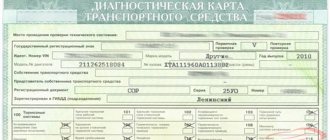Insured event under compulsory motor liability insurance:
An insured event is the occurrence of civil liability of the owner of a vehicle for causing harm to the life, health or property of victims when using the vehicle, entailing, in accordance with the compulsory insurance contract, the insurer’s obligation to provide insurance compensation;... (Article 1 of the Federal Law of April 25, 2002 N 40 -FZ “On compulsory civil liability insurance of vehicle owners” as amended by Federal Laws dated December 1, 2007 N 306-FZ, dated March 28, 2017 N 49-FZ)
Based on the above definition of the concept of “insured event”, the onset of civil liability of the owner of the vehicle is possible only when using the vehicle. Explanations on what is meant by “use of a vehicle” are given in paragraph 12 of the Resolution of the Plenum of the Supreme Court of the Russian Federation dated December 26, 2017 N 58 “On the application by courts of legislation on compulsory civil liability insurance of vehicle owners”:
“..The use of a vehicle should be understood not only as mechanical (physical) movement in space, but also all actions associated with this movement and other operation of the vehicle as a source of increased danger.
In relation to the Law on Compulsory Motor Liability Insurance, the use of a vehicle means its operation within the boundaries of roads, as well as in areas adjacent to roads and intended for the movement of vehicles (in courtyards, in residential areas, in vehicle parking lots, gas stations, as well as any other territories , on which it is possible to move (pass) a vehicle).
Harm caused by the operation of equipment installed on a vehicle and not directly related to the participation of the vehicle in road traffic (for example, a slewing bearing of a truck crane, a concrete mixer, unloading mechanisms, a manipulator boom, an advertising structure on a car) does not apply to cases of harm. the vehicle itself (paragraph two of Article 1 of the Law on Compulsory Motor Liability Insurance).”
"Reducing penalties"
This is article of the Civil Code (333rd). Consideration of an insured event (regarding the transfer of a loan from a deceased borrower to the heirs) in this aspect opens up a number of possibilities. Firstly, the bank has the right to accommodate (reduce or cancel fines) by concluding a settlement agreement if the heir does not try to dispute the debt and is ready to pay it off in full.
Secondly, the heir can appeal that the delay is not the negligence of the newly created debtor, but a consequence of unforeseen circumstances (the death of the original borrower). The heir may not have been informed regarding this point. Thirdly, he has the right to notarize the refusal of the inheritance due.
Insured event under a civil liability insurance contract during construction:
An insured event under a civil liability insurance contract is the onset of civil liability of persons whose liability is insured for obligations arising from damage caused as a result of deficiencies in the construction work specified in the insurance contract, which affect the safety of capital construction projects;... (“Guidelines for civil insurance responsibility of members of self-regulatory organizations based on the membership of persons carrying out construction"; approved at a meeting of the Ministry of Regional Development of the Russian Federation, minutes of 02.27.2010)
Insured event under insurance in case of temporary disability and in connection with maternity:
An insured event under compulsory social insurance in case of temporary disability and in connection with maternity is an accomplished event, upon the occurrence of which the insurer becomes obligated, and in some cases established by this Federal Law, the insured, to provide insurance coverage;... (clause 2 of part 1 of article 1.2 Federal Law of December 29, 2006 N 255-FZ “On compulsory social insurance in case of temporary disability and in connection with maternity”)
Insured event under compulsory social insurance:
An insured event is a fact of damage to the health of the insured person confirmed in the established manner as a result of an industrial accident or occupational disease, which entails the insurer’s obligation to provide insurance coverage;... (paragraph 9 of Article 3 of the Federal Law of July 24, 1998 N 125-FZ “On Mandatory social insurance against accidents at work and occupational diseases")
An insured event is an accomplished event, upon the occurrence of which the insurer becomes obligated, and in some cases established by federal laws, also the insured, to provide coverage for compulsory social insurance;... (Article 3 of the Federal Law of July 16, 1999 N 165-FZ “On the Fundamentals compulsory social insurance")
What diseases can you insure against?
Dear readers!
Our articles talk about typical ways to resolve legal issues, but each case is unique. If you want to find out how to solve your particular problem, please contact the online consultant form
It's fast and free!
Or call us by phone (24/7):
If you want to find out how to solve your particular problem, call us by phone. It's fast and free!
What else to read:
- Endowment life insurance (NCL): what is it, who is it suitable for, programs
- Plastic compulsory medical insurance policy: what is it and what does it come with?
- Tick bite insurance in 2021
+7 (495) 980-97-90(ext.589) Moscow,
Moscow region
+8 (812) 449-45-96(ext.928) St. Petersburg,
Leningrad region
+8 (800) 700-99-56 (ext. 590) Regions
(free call for all regions of Russia)
Health insurance includes a list of various diseases. It differs depending on the company with which the person took out the policy.
The standard list of diseases included in the insurance looks like this:
- heart attack;
- stroke;
- sexually transmitted diseases – HIV, AIDS;
- renal failure;
- paralysis;
- cancerous tumors;
- loss of vision or hearing, etc.
If the insurance owner is afraid of certain diseases, he may have to pay extra to include them in the insurance. The larger the list of diseases that the policy covers, the higher its cost.
It should be immediately noted that the policy does not allow reimbursement of costs associated with chronic diseases, diabetes, as well as heart attack and stroke, if all these conditions arose before the policy was issued. Insurance companies refuse to provide insurance to persons with these disorders, because it is unprofitable for them. If the fact of the presence of a disease is discovered after signing the contract (provided that the person deliberately concealed this fact), the insurance can be appealed, and its owner can be recognized as a fraudster.
Insured event during deposit insurance:
..An insured event is one of the following circumstances:
- revocation (cancellation) of a bank’s license from the Bank of Russia to carry out banking operations (hereinafter referred to as the Bank of Russia license) in accordance with the Federal Law “On Banks and Banking Activities”, if the Agency’s participation plan in settling the bank’s obligations in accordance with the Federal Law dated 26 is not implemented October 2002 N 127-FZ “On Insolvency (Bankruptcy)” (hereinafter referred to as the Federal Law “On Insolvency (Bankruptcy)";
- introduction by the Bank of Russia, in accordance with the legislation of the Russian Federation, of a moratorium on satisfying the claims of bank creditors... (clause 1 of Article 8 of the Federal Law of December 23, 2003 N 177-FZ “On insurance of deposits of individuals in banks of the Russian Federation”)
What is needed to apply for a policy?
To issue a policy, you need to prepare a package of documents and an insurance premium. The package of papers includes:
- general passport, for children under 14 years of age - birth certificate;
- application to the insurer;
- a list of risks that must be included in the insurance;
- additional documents confirming the professional activity of the insured (this affects the amount of payment for the policy).
Additionally, they may require a certificate of medical examination to ensure that the client does not have fatal chronic diseases. After this, it is enough to conclude a contract and pay the insurance premium. If it is not a one-time payment, but is divided into several parts, you will have to pay the fee regularly - once a month, quarterly or year.
Insured event under the contract of compulsory liability insurance of the arbitration manager:
“An insured event under a contract of compulsory insurance of the liability of an arbitration manager is the onset of liability of the arbitration manager to persons participating in the bankruptcy case or other persons in connection with the non-fulfillment or improper performance by the arbitration manager of the duties assigned to him in the bankruptcy case, confirmed by a court decision that has entered into legal force, except for the cases provided for in paragraph 6 of this article...” (clause 5 of Article 24.1 of the Bankruptcy Law)
In what cases can payments be refused?
Insurance companies quite often refuse payments for legal reasons. You will not be able to receive compensation if:
- an injury occurred that was not included in the list;
- the client died, was injured or became ill while under the influence of alcohol or drugs;
- the death is due to suicide;
- the development of a serious illness was due to the fault of the patient who ignored the doctor’s instructions;
- injury, for example in a road accident, was due to the fault of the client.
In other cases, the insurer is obliged to promptly pay compensation. If this does not happen, you can go to court.
Explanations of the Supreme Court of the Russian Federation on the insured event
Clause 12 of the Resolution of the Plenum of the Supreme Court of the Russian Federation dated June 27, 2013 N 20 “On the application by courts of legislation on voluntary insurance of citizens’ property” contains the following explanations:
In accordance with paragraph 2 of Article 9 of the Law on the Organization of Insurance Business, an insured event is understood as an event that has occurred, provided for in a voluntary property insurance agreement, upon the occurrence of which the insurer becomes obligated to pay insurance compensation to the person in whose favor the insurance agreement is concluded (the policyholder, the beneficiary).
An insured event includes the danger against which insurance is provided, the fact of causing harm and the causal relationship between the danger and harm and is considered to have occurred from the moment of causing harm (loss, death, identification of shortage or damage to the insured property) as a result of the danger for which insurance was carried out . If damage is detected outside the term of the contract, the person in whose favor the insurance contract is concluded (the policyholder, the beneficiary) has the right to an insurance payment if the damage was caused or began to be caused during the period of the contract. If, based on the circumstances of the case, the moment of causing harm cannot be reliably determined, the harm is considered to have been caused at the time of its detection.
If the danger for which insurance was provided arose during the period of validity of the contract, and the damage began to occur outside the period of its validity, the insured event is not considered to have occurred and the insurer is not liable to pay insurance compensation.
The alleged event, in the event of which insurance is carried out, must have signs of probability and chance. In this case, an event is considered accidental if, at the conclusion of the insurance contract, the parties to the contract did not know and should not have known about its occurrence or that it could not occur.
0
Author of the publication
offline 1 day
Features of the circumstances under consideration
1. If the inheritance is not legally accepted by anyone, and the loan agreement is not secured by a guarantee, then the bank is entitled to legally demand the immediate sale of this property at auction.
2. In a situation where family members of a deceased debtor use his property (for example, they are registered or live there), but do not always act as heirs at the same time, then formally they do not inherit the debts. However, if this housing is foreclosed on by the relevant bank, these family members lose the right to use this property and are also subject to eviction.
3. The borrower’s heirs bear obligations under the loan even before the legal registration of the proper right to the due inheritance.
The loan insured event under consideration is a clear example of the fact that Russian law on this issue is harsh and almost indisputable.









